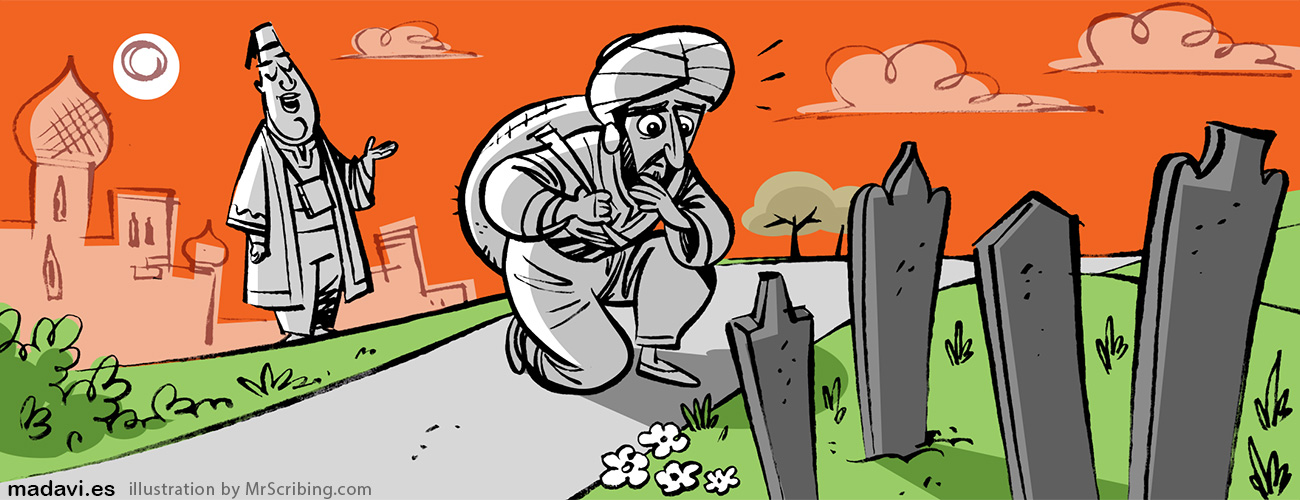This is a story of a man who I would define as a seeker.
A seeker is a person who searches, but not neccesarily someone who finds what is being sought. Neither is it someone who knows what is being sought. He is simply someone for whom life is a search.
One day the seeker felt he should go to the city of Kammir. He had learnt to pay rigorous attention to those sensations that arose from an unkwown place within himself and so he left everything and departed. After two days of walking dusty paths in the distance he made out Kammir.
A little before reaching the village, a small hill to the right of the path caught his attention. It was covered by wonderful green grass and had a lot of trees, with birds and charming flowers. It was completely surrounded by a small polished wooden fence. A small bronze door invited him to enter.
Suddenly he felt that he was forgetting the the village and succumbed to the temptation of resting for a moment in that place.
The seeker crossed the threshold and began to walk slowly among the white stones that were distributeed at random amongst the trees. He allowed his eyes, which were the eyes of a seeker, to look around. That is perhaps the reason he discovered that inscription on one of the stones….
“Abedul Tare, lived 8 years, 6 months, 2 sweeks and 3 days”. He shuddered slightly when he realised that that rock was not simply a rock. It was a tombstone. He felt sad to think that such a young child was burried in this place….
Looking around him, the man realised that the stone next to it also had an inscription.. He went over to read it and it said “Llamar Kalib, lived 5 years, 8 months and 3 weeks”. The seeker felt terribly moved.
That beautiful place was a cementary and each rock a tombstone. All of them had similar inscriptions: a name and the exact life-span of the dead person. But what really filled him with horror was the realisation that the person who had lived most had hardly lived more than 11 years.
Overcome by a terrible heart-ache he sat down and started to cry.
The caretaker of the cementary was passing by and came over. He watched him cry for a while and then asked him if he was crying for some family member.
– No, no family – said the seeker – What is happening in this village? What terrible thing exists in this town? Why are there so many children burried in this place? What is the terrible curse that hangs over these people that they have had to build a cementary for children?
The oldman smiled and said;: You can calm down, there is no curse, what happens is that we have an old custom here. I shall tell it to you. When a young man reaches his fifteenth birthday his parents give him a small book as a present, like the one I have here, hanging from my neck. It is our tradition that from that moment onwards whenever we enjoy something intensely we open the book and write down on the lefthand side what we have enjoyed and on the righthand side for how long.
Did he meet his girlfriend and fall in love with her? How long did that great passion last? A week? Two? Three weeks and a half?
And later… the emotion of the first kiss…. How long did it last? The minute and a half of the kiss? Two days? A week? And the pregnancy and birth of the first son? And the weddings of your friends? And the most desired trip? And the reunion with the brother who returns from a far away land? And the animated talks with the family? And the day that you soothed the pain of a friend? And when you helped a friend or a neighbour and they gave you their gratitude? And the day your teacher congratulated you for a work well done? And the day you congratulated your apprentice?
How long did you enjoy the pleasure from these situations?…Hours ¿ Days?…And thus we write down in the book each moment.
When someone dies it is our custom to to open his book and add up the time he enjoyed in order to write it upon his tombstone. Because for us that is the only real time lived.
Traditional story rewritten by Jorge Bucay.

